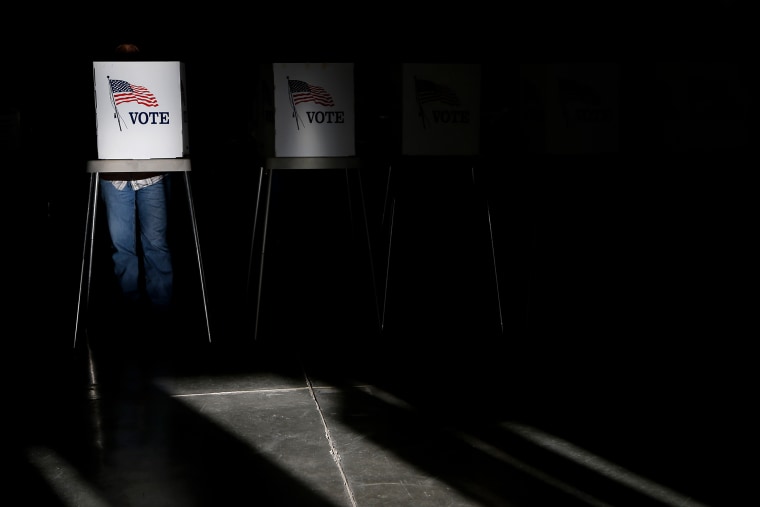It was one of the first national embarrassments for Mike Pence. Soon after the Indiana Republican was added to Donald Trump's ticket, he assured voters, "I will tell you that the Trump campaign and the Republican National Committee are working very, very closely with state governments and secretary of states all over the country to ensure ballot integrity."
The RNC quickly announced that Pence had no idea what he was talking about, and he'd really just made all of that up. The reason Republican officials contradicted Pence stems from a court-imposed consent decree imposed on the RNC many years ago, which prevents the party from doing exactly what Pence said the party was doing.
As Politico reported this morning, as of now, that decree is no more.
After more than three decades, Republicans are free of a federal court consent decree that sharply limited the Republican National Committee's ability to engage to challenge voters' qualifications and target the kind of fraud President Donald Trump has alleged affected the 2016 presidential race.Newark-based U.S. District Court Judge John Michael Vazquez ruled in an order released Tuesday that the longstanding decree ended on December 1 and will not be extended.
I can appreciate why phrases like "consent decrees" might make this story seem a little dry and complex, but stick with me because this one's going somewhere interesting.
Let's start with the background we discussed a while back. In 1981, there was a very competitive gubernatorial race in New Jersey, which the Republican National Committee was eager to win. The party was so eager to prevail that the RNC launched a program called the "Ballot Security Task Force," which involved having Republican operatives and off-duty law enforcement personnel hanging around dozens of minority-voting precincts, looking for evidence of election irregularities, and intimidating local voters.
The campaign was not subtle: Republicans put up warning signs, telling locals that their precincts were being monitored, and creating quasi-official arm bands for the party's monitors to wear while physically patrolling polling places in areas made up mostly of minority voters.
In one sense, the heavy-handed scheme worked: the Republicans successfully intimidated people of color and narrowly won New Jersey's gubernatorial election that year. But the victory came at a price: the RNC's scare tactics were so outrageous, and the scheme targeted black voters so brazenly, that the Republican Party faced a court fight that they lost.
At the time, the RNC felt compelled to accept a 35-year consent decree that included legal restrictions on the party's efforts to monitor polling locations.
It's also why the party was so eager to distance itself from Pence's 2016 claim: the RNC desperately wanted to get out from under the court-imposed constraints, which meant, among other things, that Republican officials were honoring the terms of the agreement.
Evidently, it worked. The consent decree expired and we now know a judge has agreed not to extend it further.
Why should you care? Rick Hasen, an elections-law expert at UC-Irvine professor, had a good piece on this recently in Slate:
With the consent decree gone, the RNC will for the first time in 35 years be free to begin anew efforts to spur purges of voter rolls and take potentially suppressive ballot security measures in the name of preventing voter fraud. No doubt RNC lawyers would advise against taking these steps, at least for a while, to forestall the DNC from running back to court seeking to have the consent decree reinstated.But with Trump the real head of the Republican Party these days, it is quite possible he could order a national effort to combat phantom voter fraud, just like he did with his own campaign. Indeed, making false claims about Democratic and minority voter chicanery is a cornerstone of Trump's divisive agenda. Yelling voter fraud riles up the base, helps with fundraising, and can depress minority voter turnout.The Trump era has caused voting rights activists to be extra vigilant against efforts to suppress the vote, from Trump's faux "election integrity" commission to the Department of Justice's reversal of an Obama-era position against a particular form of voter purging in Ohio. But the removal of the consent decree could supercharge voter suppression efforts, offering Trump the opportunity to hijack the RNC and direct it toward his own efforts to explain away his 3 million voter loss in the American popular vote and rile his base against poor and minority voters.
Buckle up.
